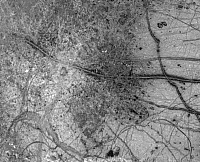Review: Cloud Atlas, by David Mitchell
Recently, I offered a big armful of books to the local veterans center to support a gift drive for Americans fighting overseas. I am not, as you may have read, a booster of the effort, and I hate to let anything go, so kind of condescendingly, I found myself wondering what awful books I could unload that a soldier would also like to read. (I also toyed with the idea of shipping over books with politically subversive elements in them, but (1) anyone sensitive to that is having a tough time of it already, and (2) those, I mostly want to keep.) So it was some Grishams, a couple old Conan novels that I meant to read when I was 14, a bunch of shitty steampunk stuff that I no longer feel guilty about avoiding, what little military fiction I had, and a few dated opinion collections of American history. A damn shame that I had finally unloaded my mother-in-law's collection of recent hardcover potboilers six months ago, those would have been perfect. It's a long segue, but the point is that the pile looks a lot thinner than usual (even as the number of books I will potentially read in it is unchanged), and I'm happy for the recent recommendations I've received. Cloud Atlas, with it's themes of power and subjugation, could have satisfied the effort of quiet evangelism that I had mind, but as it happens, it's also one that I'd rather hold on to.
Cloud Atlas follows along six individual stories, feeling out the dynamics of man's inhumanity to man along the way, examining this against the desire for peaceful coexistence, and looking at the motivations for institutional violence and for resistance (which overlap). Generally, Mitchell is telling stories of individuals against that larger backdrop. The crimes of power develop on a larger scale than the story, backed by contextual notions of state, military, religion, corporation or class, and Mitchell works out ways in which such coersion can arise from or feed back into individual behavior and whether knowledge and compassion are mitigating or damning. Civilization--is it worth it? The question isn't such a unique writing endeavor, but it's one which, I suspect, needs a higher quality bar to get the interest of cynical publishers, and I think it takes some sense of nuance to even ask. Exploring the question within a series of connected and ambiguous morality plays, over the arc of society's desperate conception all the way to its fall, Cloud Atlas reminded me a lot A Canticle for Leibowitz, which I intend as a compliment.
Structure is really this novel's bag, though, and Mitchell takes great delight in the interconnectedness between the stories, and the variations and the unusual architecture of the book. Mitchell lets six "soloists" play for awhile before interrupting them in the middle of their own story, jumping to the next solo, taking place sometime in the future, and in a different literary form. The novel moves through the 1850s, through modern times, and into a couple future civilizations, and then back down the chain. It's a great big pallindrome of a book. There's a strong implication that the human story he tells is circular, that the icon-carving tribe with its tenuous grasp of fallen civilization, is in fact the ancestors of the (non-fictional) Moriori that first soloist encounters in the Chatham islands just a few years too late. The protagonists are spiritually related, but I think it's safe to say that connection is in a purely literary, meta, sense. The voice and vehicle changes for each story (we go from traveler's diary, to personal letters, to mystery novel, to notes for a film script, to formal interview, to oral history), and the tie-ins are well-done, and neatly incorporate a handoff of both halves of the physical object of the telling (the book, the letters, etc.) between the protagonists of each section. By the end, Mitchell is vigorously shaking his own hand in terms of minor story details too.
I find that these metafictional, self-referential tricks are great when they add a sudden insight, and I think the formal arrangement of the elements increases the reader's overall engagement with this particular novel. Like with all tricks, what really matters is execution, how well you can pull them off. This sort of metanarrative does let you cheat a little, however, and the characters (and author) can't always stop themselves from a little critique, making notes on the limitations of the various storytelling media. There's a fine line between cleverness and excusing yourself for bad writing, between showing your authorial hand and distancing your readers from your characters. Mitchell stays north of it, but he gets closer than he needs to sometimes.
And it's funny what details you catch. A misplaced neologism really bugged me, (someone writing in 1931 wouldn't use the term "critical mass"). But I couldn't get myself to notice, even with effort, what spelling conventions Mitchell chose in his contemporary English and American sections. I found myself wondering how plausible the language developments in the future sections were. A couple hundred years from now, the people of his nightmare corporatocracy have evolved a slightly streamlined English, based more or less on spelling conventions from twentieth-century advertising, but I'm lacking the hook how such language should have made the geographic move to the southeast Asian setting. I liked better the voice he uses for post-civilizational section. The speech had an cadence, in which the rules of the parent tongue had obviously been loosened, improvised, and forgotten. Would a free-form language like that be the one preferred by the last tribe to hold on to writing? Well, that one works out, I think: we have the whole Middle Ages to attest to how speech can diverge from the writing forms of the dead empire.
There are also pitfalls inherent to using so many different narrative voices. I found that the solo sections didn't necessarily compare to one another equally, or even in both of their halves. The diarist Adam Ewing was a naive bore both times. The cynical urban gentleman Nick Cavendish was irritating on the ride up and funny as hell in his second act. The bigger problem is that Mitchell is consciously working with known literary types here, and as a reader, you need them to sustain some independent identity even if they satisfy the mold. The letters from Zedelghem were one of the best sections, thanks to Mr. Frobisher's witty epistolary voice, but also for the real sensitivity that was revealed beneath the character who otherwise felt he had been pulled out of Oscar Wilde's trope barrel. The mystery novel portion, on the other hand, proved to contain too much fast-rolling cliche for my tastes, with a grating present-tense narration. ("But that part's supposed to be pulpy," protests my inner David Mitchell. Maybe.) The science fiction future was very well evoked in the first half of the telling, and if (as its central character dares to observe) letting it devolve into an implausible chase sequence weakens its story, the resolution has enough geeky allegorical horror to be satisfying. (And it's great that Mitchell doesn't carry on the pretense that he's single-handedly reinventing the genre.) The after-the-fall section, deepest in the future or the past, may have been the most compelling on its own storytelling merits. As near-mythology, it's really the most canonical style he uses, but it also feels the most original.
Despite the fact that the book makes heavy use of textual tricks and authorial winks, I think it would actually make a great film. One reason is that none of the individual plots are really all that dense, and the the level of character development for the series of shorts is consistent with what you find in a well-done film, which makes more use of archetypical characters and other shortcut cues, appropriate to a medium with severe constraints on time and lengthy exposition. Anyone bought the rights yet?









